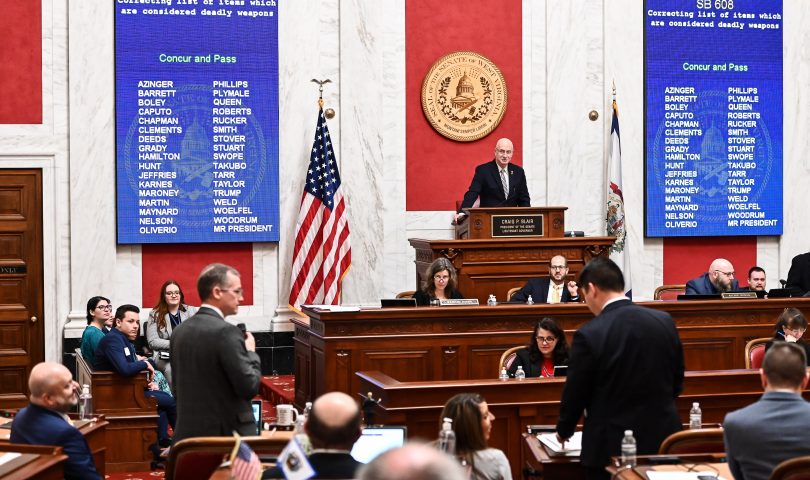MORGANTOWN – The Legislature marked its 60th and last day of the 2023 legislative session on Saturday. It was an unusual last day, with no bills in either chamber up for passage, and both sides awaiting messages and taking action to agree or disagree on amendments to their bills made by the other side.
The session ends at midnight. Here is a running look at Saturday’s Senate doings, with newest action at the top.
HB 2008 prohibits local governments from becoming sanctuary cities. It forbids non-cooperation with federal immigration laws, among other provisions. It bounced back and forth until the Senate finally accepted the last round of amendments, and it goes to the governor.
HB 3084 updates various provisions of charter school code. It makes charter schools eligible for School Safety Fund money. It allows a higher education institution to apply organize a charter school and enter into a charter school contract.
If a charter school wishes to offer a dual-credit program, its higher education partners may not impose requirements that are not required of non-charters. Charter school students may participate in public school extracurricular activities at other public schools if their school doesn’t offer them.
Charter schools may determine their own staff qualification and certification requirements. The per-pupil basic foundation allowance will go from 90% to 99%, and include state, federal and local share funds. The home county board will keep the remaining 1% for administrative expenses.
The Senate concurred with Friday House amendments and it heads to the governor.
SB 426 is referred to as the TikTok ban and was one of the several bills subjected to legislative ping pong on the last day. The House removed specific references to TikTok, aiming to allow for other emerging technologies. The bill says that the chief information security officer (CISO) will develop standards regarding banned high-risk technology platforms or products. All levels of government — local governments, K-12 schools, higher education, and state entities — must enforce those standards.
Out of concern for separation of powers, the House amended it to simply recommend that agencies in the legislative and judicial branches adopt the standards and practices put forth by the CISO.
Back in the Senate, yet another amendment restored the bill’s applicability to all branches of government and removed the mere encouragement directed at the legislative and judicial branches. They then sent it back to the House.
SB 422 came from the governor and would require each school to publish its up-to-date, county-adopted curriculum on the school’s publicly accessible website, or on the county’s if the school doesn’t have one. New or revised curriculum would have to be posted within 30 days of adoption. The Senate concurred with the House amendments and it heads to the governor.
SB 220 is the Industrial Hemp Development Act and covers the processing, distribution and sale of kratom and hemp-derived cannabinoids including delta-8 and delta-10. The bill places the regulation of the products under the Department of Agriculture and limits the sale to those age 21 and up. Sales are subject to a 11% excise tax.
The Alcohol Beverage Control Commission is authorized to assist Agriculture in enforcement. Unapproved products are considered contraband subject to seizure and destruction. There are criminal penalties to unlawful possession, distribution and sales, and for sales to underage customers.
The House amended to bill to exempt products that contain no THC, derived mostly from the plant stems, such as clothing and flip-flops. The Senate concurred with the House amendments and it heads to the governor.
SB 121 is the Student Journalist Press Freedom Act, to guarantee First Amendment protections for high school and college journalists, with specified exceptions for such things as obscene, vulgar, pornographic or sensual or illicit sexual content. The Senate concurred with House amendments and it heads to the governor.
SB 187 creates a new felony for any public or private school teacher, principal, counselor, coach, other employee or volunteer to engage in sexual intercourse, sexual intrusion, or sexual contact with any student regardless of the student’s age. Student consent, or occurrence of the act off of school property or outside of a school function do not qualify as defenses.
The Senate refused to concur to House amendments that eliminated elementary schools and added colleges for students up to age 20. It was returned to the House.




